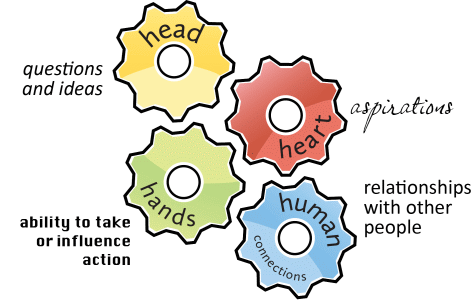 | Critical & Creative Thinking Programusing critical and creative thinking to develop reflective practice as we change our work, learning and lives |

Quick Links
Journeys: Changing Our Schools, Workplaces, and Lives
A conference-workshop to mark 40 years of the Graduate Program in Critical & Creative Thinking
Since 1979, the Critical & Creative Thinking (CCT) graduate program has been
providing students with knowledge, tools, experience, and support
to take the times it takes
to become constructive, reflective agents of change
in work, education, social movements, science, creative arts, and life.
During this one-day conference-workshop, we will create spaces, interactions, and support that help us recognize and extend the changes that we—students, alums, faculty, and associates from CCT's 40 years—have made in our schools, workplaces, and lives.
Preparing for and participating in this conference-workshop will provide an opportunity to reflect on ways that developing as a critical, creative and reflective practitioner is like a journey into unfamiliar areas—journeying involves risk, opens up questions, creates more experiences than can be integrated at first, requires support, and yields personal and professional change.
|
Location: Arlington, MA (directions) and online on zoom. (A host zoom room will be staffed at all times at short URL TBA) Date: Sunday 5th. May 2019 (from 8.45am to 5.15pm, with evening reception & dinner with tributes/testimonials from 5.15-8.15, also joinable by zoom) Registration: Late Registrations still accepted: http://bit.ly/cct40rego (no fee) Advance preparation by participants: To be distributed late April 2019. Participants are encouraged to order a copy of the new edition of Taking Yourself Seriously: A Fieldbook of Processes of Research and Engagement, which will be delivered to in-person participants on the day or online participants by mail. Proceeds subsidize workshops like this one. |
Short URL for this page: http://bit.ly/cct40

Program at a glance (as of 12/8/18)
(detailed version)Goals
In this one-day "Connecting-Probing-Reflecting" (CPR) conference-workshop we will create spaces, interactions, and support that help us recognize and extend our projects of changing our schools, workplaces, and lives. More specifically:
Tangible goals for participants
- To undertake sense-making review of our own evolving projects of changing our schools, workplaces, and lives
- To gain inspiration and new insights by sharing the ways CCT'ers have been and plan to continue changing our schools, workplaces, and lives
- To produce work-in-progress presentations about our projects and plans, gain feedback, and revise the presentations for sharing beyond the workshop.
- For participants to learn and practice Tools and Processes that facilitate substantive knowledge sharing, inquiry, critique, and discussion.
- As participants, our experience of gaining insights about critical, creative, and reflective practice excites each of us about the prospect of conversations extending beyond the 1-day CPR workshop (in time and in who participates).
- Our experience of engagement in the tools and processes excites us to seek out and pursue other engagements in a similar manner, in particular, to “connect quickly with others who are almost ready… to foster participatory processes and, through the experience such processes provide their participants, contribute to enhancing the capacity of others to do likewise.” (Taylor 2005, Unruly Complexity, p. 225).
Schedule
Time 8.30-9am
Check-in
Session 1, Getting Here & Exposing Diverse Points of Potential Interaction
Time 9am
This activity centers on Autobiographical Introductions: “How I came to be someone who would want to share and hear about past and desired future Journeys in Changing Our Schools, Workplaces, and Lives."
Giving and listening to extended autobiographical introductions emphasizes Respect—for yourself and others—from the outset, making it more comfortable for you to Risk talking about your personal journey. You may gain insights—Revelations—from what you hear yourself include in your stories.
Session 2, Digging down deep & Exposing More Points of Potential Interaction
There are two 30-minute halves to this Session, separated by a 5-minute break. In each part, the author of a pre-circulated written presentation meets with people ready to discuss their responses.
Respect continues to be emphasized—everyone, not only for the writer of the work-in-progress presentation, is an agent in shaping what can emerge from a reading. The Respect-full experience in Session 1 prepares the way for the Risk involved for the primary discussants speaking in front of the gathering as a whole. They may gain insights—Revelations—from what they hear themselves say. The listeners may too as you chew on what you share with the various speakers and how you differ from them.
Time 11:20
Break
Time: 11.45
Session 3, “I want help thinking about”
Each ‘I want help thinking about’ topic group meets for 18 minutes. The originator of the topic explains what help they seek and the group takes it from there.
Respect and Risk continue to be emphasized in asking everyone to take initiative in asking for help. You can hope to gain insights—Revelations—from what you hear yourselves ask for and from how you respond to queries and suggestions from others. At the same time, the other topic-group members can gain insights from hearing how they respond to the request for help.
Time 12.45
Session 4, Lunch plus
fund-raising for Delores Gallo fund, digestion of feedback from sessions 1, 2, and 3, and preparation of spoken work-in-progress presentations
Time 2.45
Session 5, Work-in-progress presentations
Revelation—new insights—get brought into focus as you prepare a presentations to others, hear yourselves deliver it, and get feedback
Time 3.45
Break
Time 4.00
Session 6, Dialogue Hour
Respect, Risk, and Revelation are emphasized in the listening—not only to others but also to oneself (even if silently)—that happens in a Dialogue Process. By the end of the Dialogue Hour and Closing Circle, participants should be clear about at least some issues that have (Re)engaged you through the experience of the 1-day workshop.
Time 5.00
Session 7, Closing circle
Each participant has 15 seconds to state one highlight OR appreciation OR suggestion OR thing they are taking away from the 1-day workshop to do more work with.
Taking stock and identifying alternative paths before proceeding on from an activity or event is important to strengthen participants' Revelations and Re-engagements as well as for the workshop model to be repeated, evolve in response to evaluations, and be adapted by participants
Time 5.15
Social gathering (5.15) & dinner (6.15)
Tributes, including from UMass leaders
-
(Compilation of testimonials since mid-90s)
Expectation is that you sit next to and speak with someone you haven’t got to know, perhaps circulating to keep doing this.
End at Time 8:15